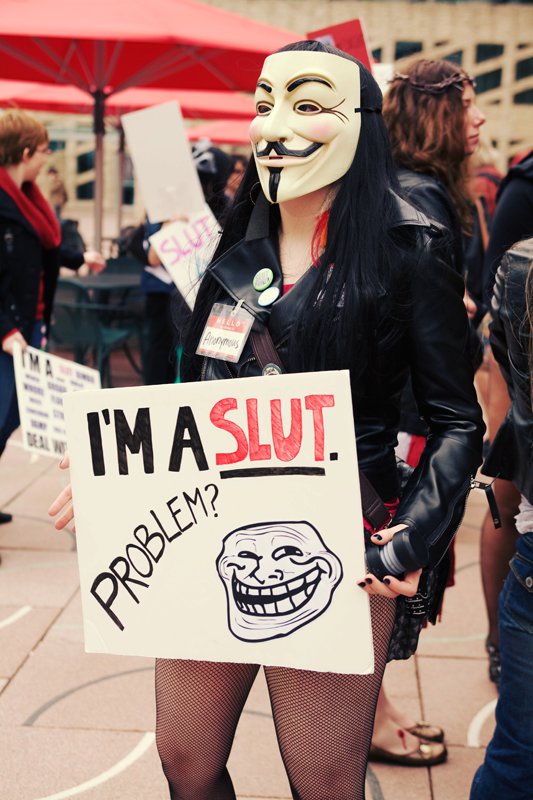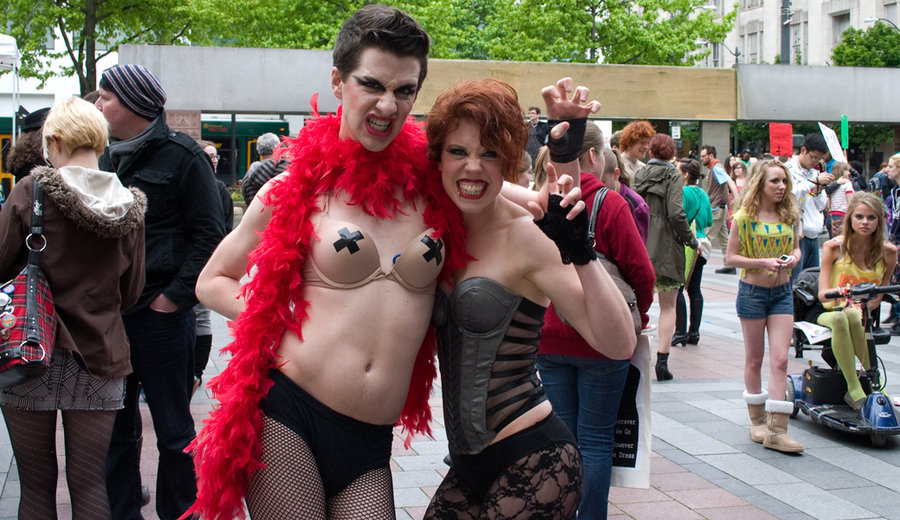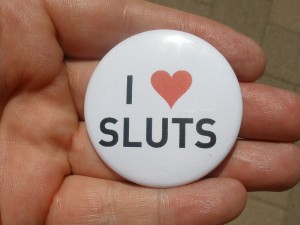Read part 1 of “Sluttier than Thou”
“Aimed at those who were sexually promiscuous, be it for work or pleasure, it has primarily been women who have suffered under the burden of this label. We are tired of being oppressed by slut-shaming; of being judged by our sexuality….”
Mythbusting Sluts
The SlutWalk is not about daring men not to feel sexually attracted to women whose fashion sense can induce sexual desire. One of the points of the movement is to dare a patriarchal society to create an environment that accommodates and respects women’s desire to look however they want in spite of other people’s sexual desire.

Photo Credit: asteroidz (deviantART)
Furthermore, the SlutWalk wants to call out the use of “slut,” not merely for describing women in “revealing” clothing, but for implying an insensitive assumption that if a girl was sexually victimized, it must’ve been because she dressed like so.
To reiterate the argument, the appalling logic behind “risk management” by clothing perpetuates the myth that women experience sexual violence because they’ve managed to provoke — deliberately or otherwise — uncontrollable sexual desire for them in their sexual predators.
Although the SlutWalk was not about rape per se, I want to take this opportunity to identify instances of rape that remotely concern the sexual appeal victims exude.
- Rape in rigidly hierarchical systems and cultures: military rape, prison rape, and clerical rape
- Corrective rape: against LGBT to cure their supposed “gender disorder”
- War rape a.k.a. “spoils of war” as in the case of comfort women during the World War II
- Genocidal rape: sexuality as a symbol of reproductive potential and continuity of an ethnic community
A slut by any other name would still be as slutty.
Germain Greer, in her article on the SlutWalk, gave her readers a fascinating history of the word:
Historically, the primary attribute of a slut is not promiscuity but dirt. The word denotes a ‘woman of dirty, slovenly, or untidy habits or appearance; a foul slattern.’ A now obsolete meaning connects it with a kitchen maid, whose life was lived in soot and grease. […] The corner she left unswept was the slut corner; the fluff that collected under the furniture was a slut ball.”
Greer isn’t sure how dirty eventually became associated with promiscuity, but the relation between the two can be found in various expressions. “Dirty mind” suggests promiscuous thinking, while “dirty jokes” describe promiscuous jokes.
Perhaps it began with a similar relation — the link between cleanliness and virginity. (Well, not so much “clean” as “immaculate,” which came from a Latin word meaning “not stained” or “spotless.”)
Anthropologists using a functionalist perspective to explain the value of virginity would point that some cultures — most probably, the patriarchal ones — might value a woman’s virginity because her sexual inexperience assures her future husband that the child in her womb doesn’t belong to any other man.
Patriarchal cultures usually don’t allow the woman to be stained by any one else but her husband, and marriage is the ritual that sanctions the staining of the woman. I’d also think that virginity is a much more important issue in women than men, since the failure of men to remain chaste doesn’t carry the risk of bearing a child, a burden to the resources of a group of individuals.
Western history, which had a long struggle with Judeo-Christian sexual repression, valued virginity in the same way. As I was looking up the definition of “immaculate” in the Oxford Dictionary — a term used to describe the conception of Jesus Christ by Mary — late Middle English actually used the term in the sense of “free from moral stain.”
It turns out, not only are slut shamers conforming to patriarchal logic, they’re also conforming to Judeo-Christian conservatism.
This is why the word “slut” needs to be reclaimed: it needs to be reclaimed from originators of its derogatory connotation.
Promiscuity need not be interpreted as a negative behavior.
Greer said it best:
“If women are to overthrow the tyranny of perpetual cleansing, we have to be able to say: ‘Yes, I am a slut. […] I could be without sexual fantasies… – pure as the untrodden snow – but I’m not. I’m a slut and proud.’ The rejection by women of compulsory cleansing of mind, body, and soul is a necessary pre-condition of liberation.”
Reclaiming a word with heavy historical baggage will be a long and arduous struggle. But we have to start somewhere.
1. Diluting derogatory effect. Reclamation of a word begins with overuse. The principle is simple enough: have many people use it and have these people use it to describe the same things but of lesser degree — in fact, use it as casually as possible. Eventually, speakers will adapt to using the word for these lesser purposes.
People may not agree with me, but I think the overuse of the word “bitch” has managed to dilute its derogatory effect. Being called a bitch in the nineties is not the same as being called a “bitch” in 2010s, especially when you have people who greet their friends with, “What’s up, bitches?”
Pioneering a word’s dilution requires a steadfast spirit of resistance and a conviction in the ethics of reclaiming it. It is a purposeful exercise in political incorrectness. You must be willing to take the risk of offending people.
Conversely, cultural (and even legal) restrictions to the use of a word regulates who gets to say it and how it is applied, thus preserving not only the definition of the word but the weight it bears as a derogatory, sacrosanct, or heinous term.
When it comes to the word “slut,” do we want to preserve the patriarchal (and even religious) intent to offend women who are promiscuous?
Well, I don’t.

God forbid, an LGBT slut. (Photo Credit: CEJoly on deviantART)
2. Reconditioning (female) response from shame to pride. Overusing the word “slut” will be useless if women don’t develop the courage to embrace the possibility that promiscuity can be empowering. No word is objectively offensive, and any word can be tailored to offend as any speaker can desire.
The objective to offend will fall flat on its face if the one being addressed is not insulted. I’m a slut, and I’m loving it.
It won’t always be the case that being called a slut won’t hurt. People are missing the point if they treat the issue of reconditioning responses as a goal rather than as sustained practice. Treat each situation as a challenge to respond with pride instead of shame. If you can summon pride most of the time, you’ve personally reclaimed “slut” from your offenders. If most women have managed the same transformation, they have, as political subjects, reclaimed “slut” from male chauvinists, misogynists, and sexists.
Ultimately, if the larger cultural community has managed the same transformation, its culture bearers have, as historical subjects, reclaimed “slut” from their patriarchal traditions of thought and language.
To reclaim or not to reclaim? The freedom to use and reclaim symbols should be exercised with caution and discernment. I don’t want to put out rules on when to reclaim or not, because there will always be exceptions to these rules. Instead, I want to cite examples and give my opinions on why I think certain strategies are ethically valuable or not.
“Nigger” is arguably stuck in a phase of reclamation where it’s typically okay for African-Americans to address themselves and each other colloquially as that, but it’s ethically revulsive for everyone else to address members of the cultural group as so. I can’t say whether it will come to a point where African-Americans will spurn its use for anyone and everyone or whether even out-groups will be in a comfortable cultural condition to use it.
This is one of those words where I believe it’s better that nobody — and I mean, nobody — should be comfortable about using it, because I cannot possibly conceive of a positive reinterpretation of slavery, a human relation historically associated with the word “nigger.” It’s just wrong, and nobody should ever be treated as one.
A problem I see with the in-group/out-group dichotomy the word creates is its inability to engage all political and cultural stakeholders in addressing a deeply violent history of oppression.
Although it’s not a word, the swastika benefits from the current restrictions placed on how it’s used. There is no positive reinterpretation of ethnic cleansing. The word “Nazi,” on the other hand, has lost its general ability to incite “moral horror” because so many people compare every single thing to being a “Nazi.” (Read: feminazi) It’s a tired metaphor, but maybe it shouldn’t be.
For something culturally relatable, I finally want to talk about “overseas Filipino worker” (OFW). I think this is a label that Filipinos should rid from their vocabulary altogether, so they can replace it with expatriate. OFW is a modification of the term “overseas contract worker,” which carried notions of contractual/temporary workers engaged in unskilled or manual labor, and it is a half-hearted attempt to lessen the discrimination Filipino expatriates experience whether they are at home or abroad.
I cringe at the term OFW also because of the tendency of politicians to valorize “OFWs” and thus legitimize their martyrdom. I don’t want people to suffer for the economic progress of the “motherland,” especially when it’s run by pricks like the Philippine Overseas Employment Administration. Why can’t people just earn a living without having to give up their human rights or have we forgotten this as a viable option? Expatriate, however, is “politically neutral” when it comes to the relationship between being a working migrant and a hero for the country. The sooner the national government realizes that they are not heroes but individuals needing protection from discrimination, exploitation, and state violence, the sooner they might realize that local employment opportunities need to be improved, especially outside Metro Manila.
Grassroots Slut
The most reasonable argument I’ve heard against reclaiming “slut” is the one put forward by Gail Dines and Wendy J. Murphy:
“The term slut is so deeply rooted in the patriarchal “madonna/whore” view of women’s sexuality that it is beyond redemption. […] Women need to find ways to create their own authentic sexuality, outside of male-defined terms like slut.”
I like their article because it is the only criticism I’ve read which is conscious of mainstream media or pop culture’s hypersexualization of women:
“These students have grown up in a culture in which hypersexualized images of young women are commonplace and where hardcore porn is the major form of sex education for young men.”
Supporting the SlutWalk shouldn’t mean that we’re forcing women to be promiscuous or to express openly their sexual identities. We’re saying instead that if they wanted to have those rights, we’d be there to fight for an environment that accommodates these desires. No judgments.
But in the age of global capitalism, patriarchal logic, as reworked by media and pop culture, has insidiously found its way back into the minds and hearts of unwitting women who’ve grown weary of feminist struggles for equality.
In an age where people are made to think that the right to consume is a fundamental human right, women are made to think that if they have the right to buy whatever they want to look however they want, they’re free and equal to men.
I admit. Women now consume more images of hypersexualized and hyperfeminine women, and the overwhelming exposure of these images to the exclusion of, well, other types and subjectivities of women promotes a narrow sense of femininity and womanhood to people, especially children*.
The trouble with contemporary culture is that more women are exposing their bodies precisely because they want to be sexualized by men. Women want to be dirty, because it pleases men to become so. And if they want it, there’s nothing wrong with it. It’s girl power. It’s Girls Gone Wild. In this way, being a “slut” ends up reproducing the patriarchal logic we set out to diminish.
But the great thing about the SlutWalk is the fact that it’s a grassroots gender and sexual movement. Unlike mainstream media which tends to privilege only particular types of women to put on a “slut” identity, the SlutWalk opened the opportunity to women to put on a “slut” identity no matter how they looked**.
Finally, the desire to expose the body is not about patronizing patriarchal logic; it’s to ridicule it. It’s to shame those who gaze with misogynistic eyes at women who expose their bodies. It’s to cause discomfort in those who might unconsciously still cling to patriarchal myths about women’s desires and sexuality.
The feminist struggle is fought on many fronts. As women struggle against cultures that force them to dress up, they struggle against cultures that force them to undress. Because of this, I cannot hold one movement responsible for resolving all the problems women face.

“Well-behaved women seldom make history.” —Laurel Thatcher Ulrich
Image of “I ♥ Sluts” from Wikipedia
*, ** (From “Report of the APA Task Force on the Sexualization of Girls“) – “Healthy sexuality is an important component of both physical and mental health, fosters intimacy, bonding, and shared pleasure, and involves mutual respect between consenting partners (Satcher, 2001; Sexuality Information and Education Council of the United States [SIECUS], 2004). In contrast, sexualization occurs when:
- a person’s value comes only from his or her sexual appeal or behavior, to the exclusion of other characteristics
- a person is held to a standard that equates physical attractiveness (narrowly defined) with being sexy
- a person is sexually objectified—that is, made into a thing for others’ sexual use, rather than seen as a person with the capacity for independent action and decision making; and/or
- sexuality is inappropriately imposed upon a person.
- The contribution by society—that is, the cultural1 norms, expectations, and values that are communicated in myriad ways, including through the media. A culture can be infused with sexualized representations of girls and women, suggesting that such sexualization is good and normal.
- An interpersonal contribution—Girls can be treated as, and encouraged to be, sexual objects by family, peers, and others.
- Self-sexualization—Girls may treat and experience themselves as sexual objects (Fredrickson & Roberts, 1997; McKinley & Hyde, 1996). If girls learn that sexualized behavior and appearance are approved of and rewarded by society and by the people (e.g., peers) whose opinions matter most to them, they are likely to internalize these standards, thus engaging in self-sexualization.
For individual women, findings across several studies indicate associations between exposure to female beauty ideals and disordered eating attitudes and symptoms, such that greater exposure to thin-ideal media has been associated with higher levels of dieting, exercising, and disordered eating symptomatology (e.g., Abramson & Valene, 1991; Harrison, 2000; Hofschire & Greenberg, 2001; Stice, Schupak-Neuberg, Shaw, & Stein, 1994;Thomsen,Weber, & Brown, 2002).
Indeed, a recent meta-analysis testing links between media exposure and women’s behavior and beliefs related to eating reported a small (d = .29) but statistically reliable effect of media exposure across 8 experimental and 12 correlational studies (Grabe,Ward, & Hyde, 2008).
ABOUT THE AUTHOR
Liz studied anthropology, international relations, philosophy, and French. She quit graduate school (for now) to pursue journalism. She still maintains that she isn’t a feminist, but watch out for more posts on gender issues in the coming weeks.




Reconditioning could work. Glee did a bang-up job with rehabilitating the word "LOSER" into something that celebrates diversity and empowers the underdog. IMHO the best techniques involve associating the word with positive role model celebs. Imagery-association creates powerful links in our brains, creating a sort of "halo-effect" on labels that used to have negative connotations.
Get a hot, popular, universally loved celebrity to come out with an ad campaign with a tagline goes "I'm XXX, and I'm proud of it" and you'll see a paradigm shift in no time.
You've completely missed the entire point of the following issues:
– Reclamation as a struggle
– Reclamation as a tool for the marginalized
– Reclamation as an act of freedom or a practice of direct democracy.
1. I must say it's awfully naive to think social struggles can be had "swiftly." Nobody ever claimed it was easy to dilute, recondition, and reclaim language and culture. (Hence, the use of the term struggle.)
Reclaiming the words "atheist," "heretic," etc., took centuries. And it was a bloody reclamation, considering the number of people who've been condemned to die because of heresy. Unfortunately, I think that only applies with the Western world and Judeo-Christian religions. I'm not so sure whether we can say the same for Muslim cultures, for instance.
2. This may not be clear in my essay, so let me explain reclamation another way.
Why is white supremacy or straight pride looked down upon? Is there any sense to reclaiming misogyny so that such people won't be addressed "derogatorily" anymore?
Reclamation is a tool of the marginalized against the privileged so the former can exert their influence in the evolutionary direction language takes.
Patriarchal logic already is the prevailing framework most people use to view, understand, and judge the world. So basically, it's ethically and politically revulsive for people who have internalized patriarchal logic to reclaim misogyny. You want people to feel good about hating and subordinating women?
The reason why I brought that up is because reclamation must be exercised by those who are not famous for reproducing and validating patriarchal logic.
Hot, universally popular celebrity? Really? It's like you totally missed the part of my essay where I referred to the effects of global capitalism, mainstream media, and pop culture to the way people build the concept of womanhood and femininity.
Please reread these parts: Grassroots Slut; Footnote on the APA report on Sexualization
You want to know why rom-coms are not empowering to women? Even if the heroin is intelligent, ambitious, and a career woman, rom coms need these heroins to look like Scarlett Johanson, Jessica Biel, or Anne Hathaway. As hyperfeminine, hypersexualized, and hyperreal women, they stand apart from every other woman whose life doesn't revolve around always looking good.
Having them reclaim slut is useless, because they are strongly complicit to patriarchal culture and because as manufactured identites that are consumed mostly for their appearance (and their talents second), they'll only be reclaiming the word for themselves and women who are like them or who give up so much just to approximate them.
3. Let me quote a part of my essay:
“But the great thing about the SlutWalk is the fact that it’s a grassroots gender and sexual movement. Unlike mainstream media which tends to privilege only particular types of women to put on a “slut” identity, the SlutWalk opened the opportunity to women to put on a “slut” identity no matter how they looked**.”
SlutWalk as a mass protest is a practice of direct democracy. That’s what empowerment means — self-representation, self-determination.
If you want to know why a “celebrity endorser” is useless, well, it’s because it implies permanent helplessness on the part of non-celebrity women.
If, as an “ordinary” woman, you are in a society that believes only celebrities can carry your cause for gender equality, and it’s okay for men to like sluts but it’s not okay for women to like themselves as sluts, then you have all the more reason not to take things lying down. It means you are in a society that still wants to repress, not only your sexuality, but your ability to have your own voice and exercise the power to direct your political subjectivity.
sorry if I didnt make the context of my earlier comment clearer. I was merely adding to the thread you and Percier were discussing earlier, that is, reclamation "in general". It wasn't meant to be taken in context of the Slutwalk issue or even feminism at all.
Taking a page from Gladwell's Tipping Point books, the 80/20 rule (20% of "special people" have the power to influence 80% of the population), these movers and shakers can influence more people than the regular joe. I think even Globe is tapping into this social phenomena by piggy-backing into the drawing-power of the "connectors" and "mavens" of the Philippine blogosphere in their Globe Tat contest.
I do believe that mavens (like celebs) have powerful influence to sway public opinion. PETA makes heavy use of them in their ad campaigns to project a more positive image of vegans by using very attractive celebrities to rehabilitate how the public thinks of vegetarians being mere hippies and new-agers. The 'Got Milk' campaign also uses star-power to rehabilitate the notion that milk is only for kids.
But I agree with your point that such techniques would be ineffective in what Slutwalk is trying to achieve. Even if say, Lady Gaga were to endorse the campaign, it would be useless because "it takes Lady Gaga to pull off dressing like Lady Gaga". Anyone else walking around in public wearing the exact same look would not be afforded the same leeway as the original celebrity.
Sorry to have muddled the pool, next time I will qualify my statements better, consider me sufficiently chastised by your profuse rebuttal. I'm sure such enthusiastic repartee as yours will only serve to encourage healthy dialogue in the future. I feel 'empowered' already by being called 'naive'.
That 20-80 rule sounds simplistic… Or cumbersome. How exactly did they arrive at that figure? The explanation also isn't clear. Do you mean that given ten individuals composed of two "influential" people and eight ordinary people, the two can affect those eight 100% (or 80% of the eight)? Or do you mean that only two out of every ten "influential" people have the power to influence eight of the ten "ordinary" people who've been exposed to their personas?
And I'm curious to know the extent of the influence. For instance, are PETA campaigns supposed to convert people to vegetarianism or veganism or are they supposed to merely change the perception people have of vegetarians and vegans? (If it's perception, I'd be interested to know whether there was a study and how this study measured "perception change."
Besides, assuming but not conceding that the 20-80 rule is an empirically validated figure, it doesn't address the issue of how messages are received by individuals who've already been overwhelmingly exposed to patriarchal ideals of womanhood and femininity. Scarlett Johanson posing as a proud slut will just be influencing four other people to think that girls who look like her can become proud sluts.
I would also be careful about comparing the "behavioral shifts" or "perception modifications" ad campaigns promote with the SlutWalks, because the latter is a politically charged issue and it has a deeper history than say, drinking milk. While animal rights is also a political issue, the ambition of the PETA campaign is not as radical (and in fact, senselessly conservative) since it only aims to modify a perception that non-meat eaters are not necessarily hippies. (Knowing that vegetarians and vegans can look good does not compel me to treat animals better.)
Yes, I have no qualms calling out careless comments bluntly especially when it implies to me that the commenter probably didn't finish reading my post.
I also didn't call you naive. I said, "It's awfully naive to think social struggles can be had 'swiftly.'" "It" refers to the thought, not you. (To think social struggles can be had "swiftly" is awfully naive.)
2 meanings of Slut = 1.People who didn't receive real love and abused 2. People who receive real love but doesn't believe its real so they abuse it 😉
In fact, most Filipino Freethinkers are enjoying the bountiful fruits of reclamation. We should not forget that the terms many of us call ourselves with pride — atheist, heretic, heathen, infidel, ungodly, unbeliever, irreligious — were all invented to insult, dehumanize or demonize. And we should not forget that it took a deliberate reclamation so that these words can be transformed from being derogatory to being designatory.
"Diluting derogatory effect. Reclamation of a word begins with overuse. The principle is simple enough: have many people use it and have these people use it to describe the same things but of lesser degree — in fact, use it as casually as possible. Eventually, speakers will adapt to using the word for these lesser purposes."
I am proud to be part of a generation of Hiligaynon speakers who have performed such a reclamation. The word is 'biga-on', a word that is not unique to Hiligaynon but is also part of other Visayan languages. In its old meaning, the meaning it had when I was a child, 'biga-on' is an adjective that can be translated to 'promiscuous' or, more to the point, 'slutty'. It was a profane, derogatory and very offensive term that had no place in so-called decent conversations; the grown-ups would punish the young ones who utter the word. Calling someone 'biga-on' was equivalent to calling someone 'puta' in Tagalog/Filipino.
However, my generation started using the adjective to mean 'provocative' or 'daring'. Fortunately, this new usage became fashionable, perhaps precisely because the grown-ups prohibited the use of the word; profanities are very attractive to the youth. Over-usage eventually transformed the meaning to 'overly-stylish' and then to 'fashionable', 'snazzy', 'du jour'. Today, only the old Hiligaynon speakers still use it as a derogatory term. If an old man damns his granddaughter for being 'biga-on', the granddaughter might even take it as a complement when a decade or so ago she would have been deeply hurt.
Wow! As a former anthropology student, that case study fascinates me immenesly. 😀
I'm wondering myself whether it could be done for the words "puta" and "pokpok." I'm a bit unsure about puta, because when mapped linguistically, it shows that it also denotes "prostitute."
I'm all for reclaiming "pokpok" especially since I don't know the formal and non-derogatory tagalog translation for "promiscuous." (In fact, if this neutral term for "promiscuous" is not accessible or isn't known to the typical contemporary tagalog speaker, then I'd be troubled and it'd be a stronger case for reclaiming "pokpok.")
The case of "biga-on" is indeed wonderfully fascinating. In fact, when you look at the old people still using the word in its old sense, you will really see their frustration over the fact that their patriarchal message does not get across. When a word like that looses its sting, the patriarchal machinery will lose one if its whips. It is a big blow to patriarchy and is thus a victory to women's liberation, although I must admit that the Ilonggas still have a long way to go.
BTW, this reminds me, a similar reclamation is also underway for the Tagalog word 'malandi'. Calling all "taong malandi", let us unite and take pride in our kalandi-an!
As for "puta", although we could not redefine it, I think we can still remove its derogatory connotation. It could be converted to a neutral term like "prostitute".
I'm also pro-pokpok! And yes, it will be deeply troubling if no neutral, non-derogatory Tagalog word for promiscuous can be created.